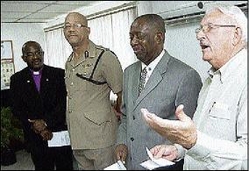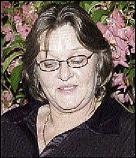19 years of Crime Stop and counting - Public-information requests have aided police significantly
Published: Friday | March 27, 2009

Peter John Thwaites (right), chairman of Crime Stop, delivers his message during the dedication of the newly renovated office of Crime Stop last month. The new office replaces the old Constabulary Communications Network office next to the Police Commissioner's Old Hope Road office in St Andrew. Also pictured are Superintendent of Police Calvin Benjamin (second right); Bishop Gary Welsh (left), chaplain - non-geographic police formations, Jamaica Constabulary Force, and Acting Commissioner of Police Baldwin Burey. - Norman Grindley/Chief Photographer
Jamaicans have reacted favourably to Crime Stop, as figures coming from the programme suggest an overwhelming success rate since its inception on September 6, 1989, to December 31, 2008.
"It has been very successful," Prudence Gentles, who has been Crime Stop coordinator for the last 17 years, told The Gleaner.
Gentles said the ratio of success to calls investigated was 1:6.
While admitting there was room for improvement, Gentles expressed satisfaction with the integrity of the programme, saying no caller has ever been compromised.
"We don't want anybody's name. We try very, very hard not to breach the confidentiality aspect, or else the programme will go down, that is first and foremost," Gentles said.
The coordinator was particularly pleased with recent surveys showing a 99 per cent confidence rate in Crime Stop over the last three years.
"That is very satisfying," she said. "Remember too, Crime Stop is not just about murder or illegal firearms but it is about any crime committed."
Gentles said results from Crime Stop, which is 20 years old this year, also pointed to huge successes in the seizure of illicit drugs.
From 2000 to 2008, the period for which figures are available, the value of narcotics seized was $349,278,676.
Property recovered
The police also recovered property valued at more than $156 million.
Among the list of approximately 30 items recovered are stolen motor vehicles and motor bikes, scrapped motor vehicles, motor vehicle parts, food items, DVD and CD players, jewellery, dynamite, bullet-proof vests, two-way radios, cellphones, cameras, clothing, goats, computer equipment, laptops, counterfeit currency and other items.
On the matter of corruption, 42 calls were made to report acts of alleged corruption, up to April 30, 2008. One arrest was made in this area in 1991.
Since the start of the year there has been one call relating to corruption but no arrests.
Based on figures for the first two months of 2009, the support for Crime Stop is continuing to grow.
For January and February there were 128 and 111 calls respectively, resulting in a total of five persons being arrested.
For January, $114,000 was paid out. The figure fell to $74,000 in February for a year-to-date total of $188,000 being paid out for information.
Value of recovered property
In January, $4 million worth of property was recovered as against $946,200 for February, for a $4.9 million total while the value of narcotics recovered rose sharply from $841,000 in January to $6,654,500 in February for a total of $7,495,500.
While there were 15 fewer calls in 2008 (794) compared with 2007 (809), the clear-up rate for last year was better, with success coming once in every five calls, compared with one in every seven calls the previous year.
Crime Stop had its genesis in 1987 when a group of private sector businesses and service organisations appealed to the government, in an open letter, to re-establish the rule of law and security of the people.
This letter led to the establishment of a crime-stoppers programme similar to that in operation in other countries.
By May 1989 one million dollars was raised and the National Crime Prevention Fund was set up. The Crime Stop programme was launched September 6, 1989.
Successes after 19-plus years of Crime Stop

Gentles
18,415 calls
1,896 arrests
544 guns
48,351 rounds
$15m in rewards
If you witness a crime, call Crime Stop at 311








